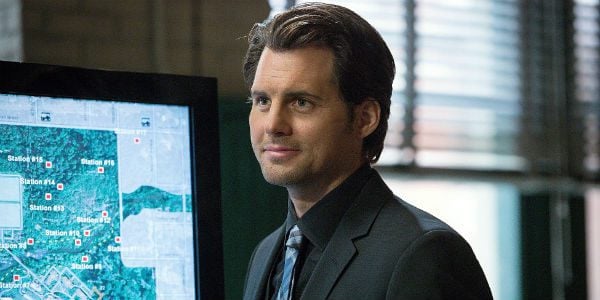In the feature film “Where Hope Grows,” currently in theaters, Kris Polaha plays Calvin Campbell, a former pro baseball player who had to retire early due to panic attacks. A single father of a teenage daughter (McKaley Miller), he’s drinking too much and on a downward spiral, until he meets a grocery-store worker, nicknamed Produce (David DeSanctis), with Down’s syndrome.
Produce’s friendship, and his devotion to his work and his church, slowly help Campbell find his way toward redemption.
Polaha also was part of the cast of Fox’s police dramedy “Backstrom,” which unfortunately just got the ax after one season. Created by Jesuit-educated Hart Hanson (“Bones”), that show had a Christian character, a police detective (Dennis Haysbert), who moonlighted as the pastor of a storefront church. Polaha’s character, Detective Peter Niedermayer, was of a philosophical bent, but more in a New Age direction.
The reality of the actor’s life is a bit different.
At a recent press junket for “Where Hope Grows,” Polaha reflected on appearing in a faith-based film, doing “Backstrom,” and being more public about his own beliefs.
“Not that I’m going through any faith struggles,” he said, “but in a weird way, honestly, as a Christian, there was a long time where I was just like, ‘I’ll just quietly let my light shine.’ Then, all of a sudden, I’m in two projects, that both of them are out and out. It isn’t the same world that it was five years ago or 10 years ago.
“I get to be an open Christian actor. We’ll see — maybe I won’t work anymore.”
He liked that “When Hope Grows,” like “Backstrom,” had Christian elements but also featured deeply flawed people who are struggling like many folks are today, with no easy answers.
“There’s these faith films,” said Polaha, “they’re very saccharine, and they’re sort of preaching to the choir. They’re talking to an audience that’s already converted, and [writer/director Chris Dowling’s] thing was, ‘I’m just going to make a movie, that’s a movie for everybody.
“When I read it, I was like, ‘This is a movie with a really great message that I think can speak to a huge audience, and not just an audience that’s faith-based.’ And Chris delivered on the promise of the script. The movie itself looks like an indie film that you’d go and see. It talks about alcoholism in a way that is mature and helpful.
“It’s a movie about redemption and second chances, and who doesn’t long for that at certain points? It doesn’t matter if you’re a Christian or if you’re Jewish or if you’re a Muslim or if you’re an atheist, it doesn’t matter what you are. We’re human beings, and we all share this story, this life, and we’re on a steady march to the grave.
“The thing about media and movies and art, it’s a quick respite from that march. You take a minute to look at your life. To sit in a dark room with strangers, or if it’s at home, in that room, and you get to focus on other people for a minute. It gives you a chance to reflect.
“With movies, what you eat is what you are. If you put in stuff that’s violent or aggressive or sexual or whatever it is, it wears off on you after a while. So, to be part of something that is really well done and feeds the soul in a way that is mature, and is something that really doesn’t matter where you come from in life, you’re going to take something away from this movie and be like, ‘Wow,’ because we’re all a little broken …
“That’s what I love about movies, and that’s why this one spoke to me.”
Here’s a peek at “Where Hope Grows” …
Image: Courtesy Fox














